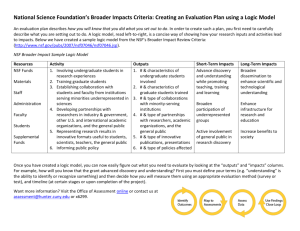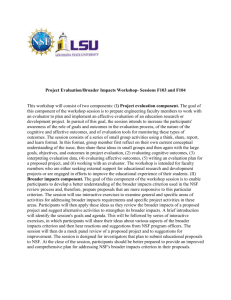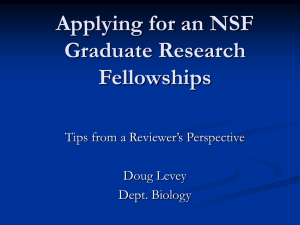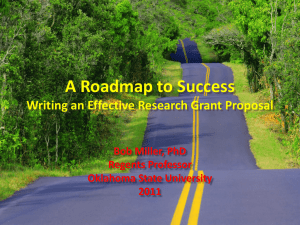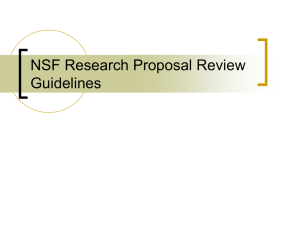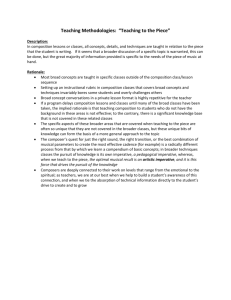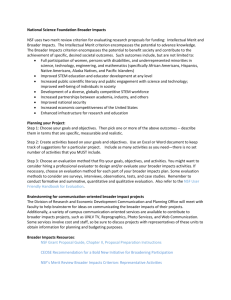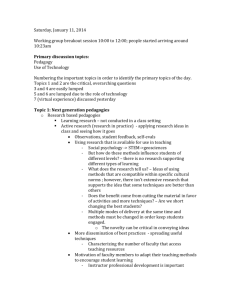Working Group Session 6finalreport
advertisement
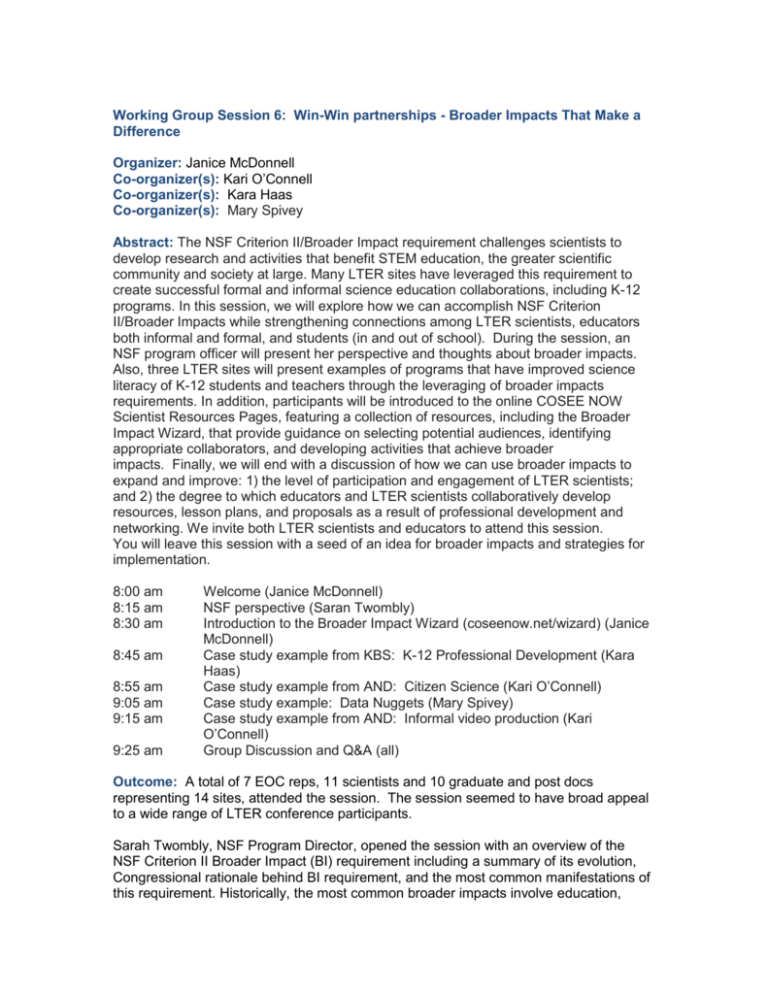
Working Group Session 6: Win-Win partnerships - Broader Impacts That Make a Difference Organizer: Janice McDonnell Co-organizer(s): Kari O’Connell Co-organizer(s): Kara Haas Co-organizer(s): Mary Spivey Abstract: The NSF Criterion II/Broader Impact requirement challenges scientists to develop research and activities that benefit STEM education, the greater scientific community and society at large. Many LTER sites have leveraged this requirement to create successful formal and informal science education collaborations, including K-12 programs. In this session, we will explore how we can accomplish NSF Criterion II/Broader Impacts while strengthening connections among LTER scientists, educators both informal and formal, and students (in and out of school). During the session, an NSF program officer will present her perspective and thoughts about broader impacts. Also, three LTER sites will present examples of programs that have improved science literacy of K-12 students and teachers through the leveraging of broader impacts requirements. In addition, participants will be introduced to the online COSEE NOW Scientist Resources Pages, featuring a collection of resources, including the Broader Impact Wizard, that provide guidance on selecting potential audiences, identifying appropriate collaborators, and developing activities that achieve broader impacts. Finally, we will end with a discussion of how we can use broader impacts to expand and improve: 1) the level of participation and engagement of LTER scientists; and 2) the degree to which educators and LTER scientists collaboratively develop resources, lesson plans, and proposals as a result of professional development and networking. We invite both LTER scientists and educators to attend this session. You will leave this session with a seed of an idea for broader impacts and strategies for implementation. 8:00 am 8:15 am 8:30 am 8:45 am 8:55 am 9:05 am 9:15 am 9:25 am Welcome (Janice McDonnell) NSF perspective (Saran Twombly) Introduction to the Broader Impact Wizard (coseenow.net/wizard) (Janice McDonnell) Case study example from KBS: K-12 Professional Development (Kara Haas) Case study example from AND: Citizen Science (Kari O’Connell) Case study example: Data Nuggets (Mary Spivey) Case study example from AND: Informal video production (Kari O’Connell) Group Discussion and Q&A (all) Outcome: A total of 7 EOC reps, 11 scientists and 10 graduate and post docs representing 14 sites, attended the session. The session seemed to have broad appeal to a wide range of LTER conference participants. Sarah Twombly, NSF Program Director, opened the session with an overview of the NSF Criterion II Broader Impact (BI) requirement including a summary of its evolution, Congressional rationale behind BI requirement, and the most common manifestations of this requirement. Historically, the most common broader impacts involve education, teaching and training. She advised a successful BI would have the following components: a PI passionate about the work described in the BI, a clear statement of the project and the PI’s involvement, and a clear link between the research in the proposal and the BI. Case studies of effective BI products provided examples of the array of BI possibilities, and stimulated discussions on the elements of an effective BI statement. Audience identification, educational objectives, budget, project description, and evaluation were discussed as important components of an effective statement. Case study examples illustrated how working with a professional educator partner can generate significant impact with modest funding. Overarching goals for BI projects include: 1) improve public decision making; 2) Enhance the capability of future generations to develop and use new scientific information and technology; and 3) addressing future workforce issues, including recruiting & retaining higher level graduate students. Demonstration of the COSEE NOW Scientist Resource Pages and Broader Impact Wizard gave participants a tool to use in developing future BI statements and projects. Regarding assessment of BI projects, NSF representative Saran Twombly noted that evaluation may not always be necessary, especially for smaller BI projects. Overall, session participants were engaged in the session offering many comments and questions. All agreed that LTER had unique abilities to focus on data synthesis and helping the public understand the importance of long-term data collection to understanding the Earth system. Session participants were interested in building “win-win” relationships and finding an appropriate collaborator interested in doing education and outreach to broader audiences. Participants discussed the desire to contribute to public understanding of science and be recognized (within and outside of NSF) for their education efforts. Scientist participants were interested in networking with education professionals who can help them connect to existing high quality education and outreach projects with a range of budget levels. As a result of the working group, Win-Win Partnerships – Broader Impacts That Make a Difference, participants can be expected to have a deeper understanding and appreciation for the NSF Criterion II requirements, to know how to network with collaborators when constructing their BI statements for proposals and use the COSEE NOW BI Wizard to initiate building a strategic and rigorous BI statement.
